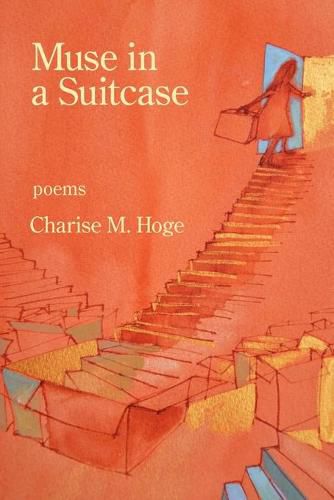Readings Newsletter
Become a Readings Member to make your shopping experience even easier.
Sign in or sign up for free!
You’re not far away from qualifying for FREE standard shipping within Australia
You’ve qualified for FREE standard shipping within Australia
The cart is loading…






Open this book / travel-case for abundance: salted dried plums,
peppery bloomskins,
the wind on a crescendo,
walking prayers,
imponderability of place,
saris that sway to the call. Open it for intoxication of a star from nebula freeing ; for absinthe not of absence, but presence; for nuance, like red rose petals sprinkled to warm a marble throne ; for folios of olive trees; for the fine company of Charise Hoge and her metamorphic perceptions that speak the feminine, the human.Angela Ball, Center for Writers, University of Southern Mississippi
Charise Hoge sings, weeps, laughs, plays, and dances her delicious poems. And, oh, does she ever travel, too! The muse might be in her suitcase, yes, but this muse unpacks and gets out there, whether the setting is France, India, Panama, or Morocco, to name just a few of the countries that infuse these substantive, pithy poems. Hoge never forgets sound and wordplay ( heresy / hearsay,
sunny side up, dawn,
trial of trail ), and occasionally, she adds delightful, subtle rhyme. While she comments on life’s important concerns ( we do not deny our tendency to crumble ), her keen eye finds truth in humor, as it did during the poet’s morning rush-hour drive past a church, where the sign read: The Gospel According to Moss. This book is a gem.
Anne Harding Woodworth, Author of Trouble and The Eyes Have It
Music-making begins in the title of Charise Hoge’s new chapbook, Muse in a Suitcase, with its suggestion of travel as tempo, transit as transcendence. Hoge’s poems are not a tourist’s, however, even if she calls herself that sometimes. The narrator identifies with what she sees, as in Wayfarer, an assonant, alliterative song that merges into the scene: women walking prayers / weaving to the Western Wall / wallpapering like wisteria. In the rhymed couplets of Daresay, she sits knee to knee with others at a Hindu temple-hive that thrums, / saris that sway to the call, the drum. These poems are pilgrimages toward the making of themselves-and therefore incomplete, open to revelation. In Questions of Travel, Elizabeth Bishop queries her own way of travelling: Is it right to be watching strangers in a play / in this strangest of theatres? Hoge would not compare herself to Bishop, but I think Bishop might admire the way the poems in Muse in a Suitcase
Jubilate in chants to provide some answers.
LaWanda Walters, Author of Light Is the Odalisque
$9.00 standard shipping within Australia
FREE standard shipping within Australia for orders over $100.00
Express & International shipping calculated at checkout
Open this book / travel-case for abundance: salted dried plums,
peppery bloomskins,
the wind on a crescendo,
walking prayers,
imponderability of place,
saris that sway to the call. Open it for intoxication of a star from nebula freeing ; for absinthe not of absence, but presence; for nuance, like red rose petals sprinkled to warm a marble throne ; for folios of olive trees; for the fine company of Charise Hoge and her metamorphic perceptions that speak the feminine, the human.Angela Ball, Center for Writers, University of Southern Mississippi
Charise Hoge sings, weeps, laughs, plays, and dances her delicious poems. And, oh, does she ever travel, too! The muse might be in her suitcase, yes, but this muse unpacks and gets out there, whether the setting is France, India, Panama, or Morocco, to name just a few of the countries that infuse these substantive, pithy poems. Hoge never forgets sound and wordplay ( heresy / hearsay,
sunny side up, dawn,
trial of trail ), and occasionally, she adds delightful, subtle rhyme. While she comments on life’s important concerns ( we do not deny our tendency to crumble ), her keen eye finds truth in humor, as it did during the poet’s morning rush-hour drive past a church, where the sign read: The Gospel According to Moss. This book is a gem.
Anne Harding Woodworth, Author of Trouble and The Eyes Have It
Music-making begins in the title of Charise Hoge’s new chapbook, Muse in a Suitcase, with its suggestion of travel as tempo, transit as transcendence. Hoge’s poems are not a tourist’s, however, even if she calls herself that sometimes. The narrator identifies with what she sees, as in Wayfarer, an assonant, alliterative song that merges into the scene: women walking prayers / weaving to the Western Wall / wallpapering like wisteria. In the rhymed couplets of Daresay, she sits knee to knee with others at a Hindu temple-hive that thrums, / saris that sway to the call, the drum. These poems are pilgrimages toward the making of themselves-and therefore incomplete, open to revelation. In Questions of Travel, Elizabeth Bishop queries her own way of travelling: Is it right to be watching strangers in a play / in this strangest of theatres? Hoge would not compare herself to Bishop, but I think Bishop might admire the way the poems in Muse in a Suitcase
Jubilate in chants to provide some answers.
LaWanda Walters, Author of Light Is the Odalisque